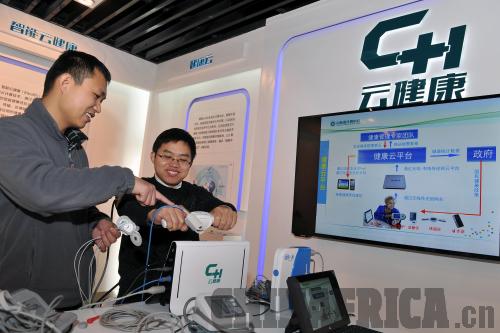| 
Resarchers collect data through a cloud computing-based health monitoring system developed by the Shandong Computing Science Center in Jinan, Shandong Province, on February 24 ZHU ZHENG
Recently, a female student in Shanghai-based East China Normal University received a text message from a faculty member, which said, "Last month, you spent less on meals. Are you in financial difficulty? If so, please contact me via phone, text message or e-mail."
The student posted the screenshot of the message on her micro-blog. She said that her meal card spending dropped because she was on diet. Nonetheless, she was touched by the school's care for her.
This "misunderstanding" could not have existed if not for big data. The East China Normal University has developed a data mining system to automatically track students' meal card spending. If a student's spending falls under a certain level, a designated faculty member will send the student a short message to check whether he or she is experiencing financial difficulty.
In response to concerns about whether this constitutes an invasion of privacy, the school said that the system is an internal work system, and all data are kept confidential and will not leak out. Furthermore, communication with students is anonymous, so even the faculty member sending a message does not know the identity of the student they are contacting.
Data boom
Many people, much like the dieting student, have not realized that big data, an emerging popular technology, is already very close to them. To promote people's understanding of big data, the China Association of Science and Technology hosted a seminar on December 25, 2013, during which five scientists introduced the big data technology and its application in daily life to reporters.
The phrase "big data" first appeared in a central government work report during China's annual legislative session this March, suggesting that the state leadership has realized its importance.
"From Silicon Valley to Beijing, big data has been a much-talked about topic. With smart phones and portable computing devices, any change in our behaviors, locations and biological data becomes data that can be recorded and analyzed," said Tian Suning, Chairman of the China Broadband Capital Partners, a private equity firm focusing on media and communications investment.
Tian is a reputed advocate of China's cloud computing and big data technology. He strongly recommends Big Data: A Revolution That Will Transform How We Live, Work, and Think, a pioneering book authored by Viktor Mayer-Schönberger, a professor at the University of Oxford's Internet Institute who predicted the dawning of big data era. Tian wrote the preface to the book's Chinese edition, in which he said that the era of mass production, sharing and application of data has arrived.
"After the birth of social media, big data inevitably arrived," said Xu Zipei, an information management expert. Last October, Xu won a prize in China for his contribution to research on big data.
"Social media has revolutionized human society. After its inception, netizens all over the world began to contribute data. This special kind of data can be called unstructured data," Xu said.
Even though social media has been around only a little more than eight years, yet the amount of unstructured data generated by it have already accounts for 75 percent of all data in the world, according to Xu.

The launching ceremony of Are You Normal?, an online variety show, is held in Shanghai on March 27. The show uses big data to evaluate whether contestants' answers to questions about a behavior or thought is popularly accepted or not COURTESY OF TENCENT INC.
Data-based
Are you Normal?, which has been streamed on the Internet weekly since April 10, is China's first variety show to be produced using the big data technology.
The show is produced by Tencent, one of China's largest Internet service providers, in cooperation with Vivid Media (Shanghai) Co. Ltd., a leading integrated all-media operator in the country.
As expected by its producer, the program has caused a big stir. The first three episodes generated more than 112 million clicks in the first month.
On its surface, the show is not much more than a combination of a talk show, a reality show and a quiz show. Ordinary people from all walks of life are invited to answer questions. After answering a question correctly, they win a prize.
What really makes the program stand out, however, is its usage of big data to generate questions and answers for the show.
In every episode, a contestant is asked eight questions, about whether a behavior or thought, such as marrying without owning a house or sleeping naked, is normal.
In order to find the most accepted answer, the production team surveys users of Tencent services. If more than half netizens surveyed reply positively, then the behavior or thought is considered "normal."
The survey covers people in different areas and across different age groups. Some questions were answered by more than 9 million respondents.
Data collected by the program's production team act as a weathervane that can tell about people's beliefs, habits or aesthetic standards, according to an anonymous social scholar who was quoted by Shanghai-based Dongfang Daily.
Improving livelihood
Cheng Zhi, a government worker in Beijing, is a loyal fan of Are You Normal?. As a Ph.D. candidate specializing in sociology, she cares about the numbers behind the show.
"I think many people are just like me, trying to judge whether a behavior is normal or not through big data. They want to understand society better and find solutions to its problems," Cheng said.
One episode shocked Cheng, however, when it was revealed that 55 percent of netizens said that they once considered committing suicide. "Yet this is very normal, given the pressure that Chinese people are currently subject to," Cheng said.
"The most fundamental function of the big data technology is to forecast what will happen in the future based on certain patterns," she noted.
Cheng likened a city to an enormous data base. It is the source of big data, and it is also changed by big data. "Maybe we are still on the eve of the big data era, yet we can already barely live without," she said.
According to Cheng, she first became aware of the big data technology after an online purchase of a book on pregnancy. "I bought the book for my sister, who wanted to have a baby. In the following 10 months, advertisements on products for expectant mothers and babies kept on popping up in my Internet browser," she said. "The advertisements I received were customized to my online purchasing and inquiry records."
"Recently, the big data technology has been widely used in Internet finance and education sectors to tailor their services to specific client needs," said Shuai Peng, Deputy Director of Internet search company Baidu's Research and Development Center.
Shuai said that the big data technology has made what was impossible in the past possible, and that it would certainly change people's life more profoundly in the near future.
In the public service sector, the big data technology has great potential to tap, said Xu Jihua, Feng Qina and Chen Ruzhen in a book on public administration in the big data era that they co-authored.
The government controls big data in various fields such as population, traffic, health care, social insurance, taxation and urban planning, Chen said. Nonetheless, data kept by various government departments has not been effectively synthesized to serve the people, he commented.
Now, the big data technology has given Beijing residents access to new public services when logging onto Mybj.gov.cn, a portal run by the Beijing Municipal Government, such as paying public utility bills and making appointments with doctors.
"This is just the beginning," Xu said, who believes that the government will provide more customized services through the Internet in the future. |